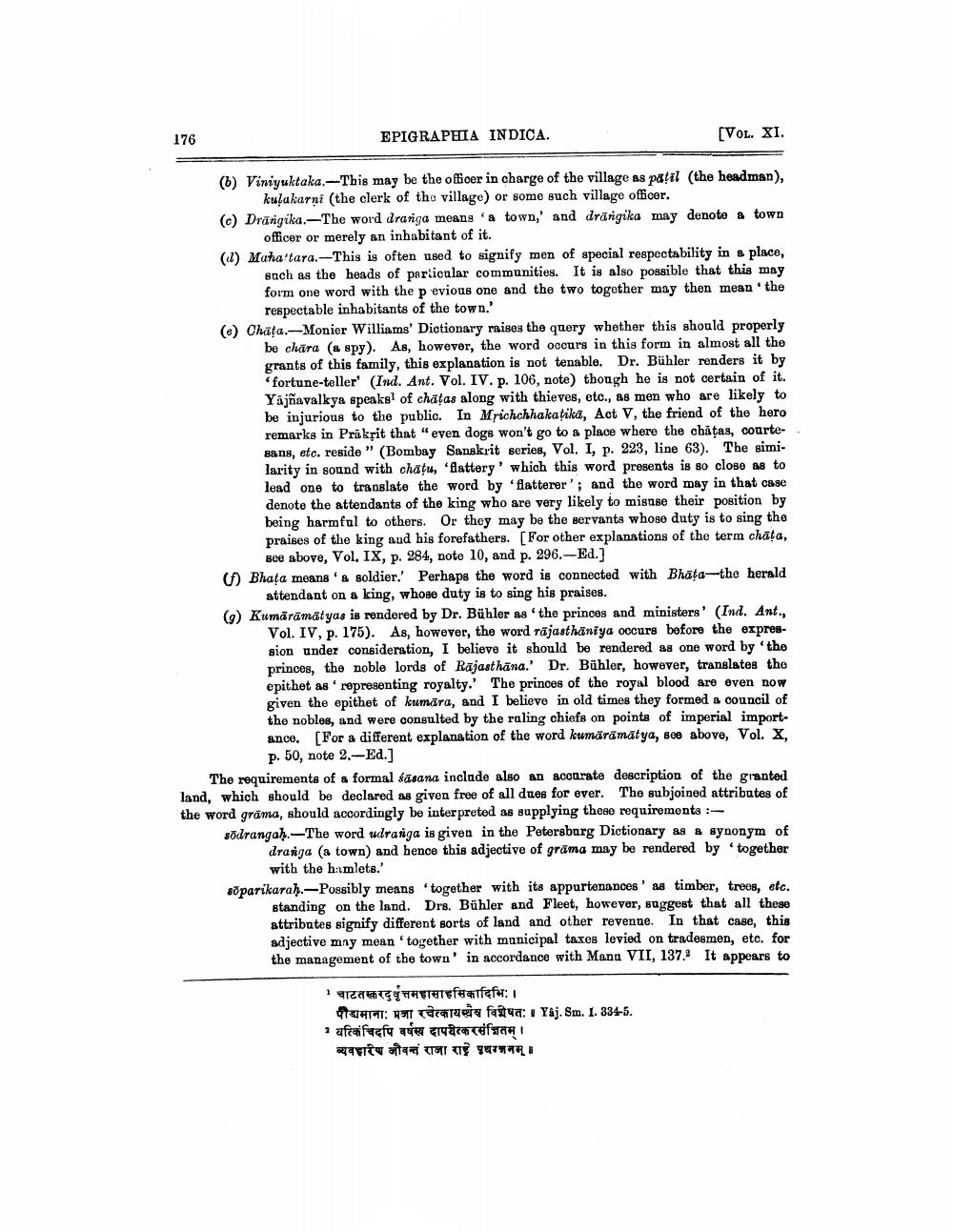________________
176
EPIGRAPHIA INDICA.
(VOL. XI.
(6) Viniyuktaka. This may be the officer in charge of the village as palil (the headman),
kulakarni (the clerk of the village) or some such village officer. (©) Drārigika.-The word dranga means 'a town,' and drārgika may denote & town
officer or merely an inhabitant of it. (a) Maha'tara.--This is often used to signify men of special respectability in a place,
such as the heads of particular communities. It is also possible that this may form one word with the p evious one and the two together may then mean the
respectable inhabitants of the town.' (@) Chata.-Monier Williams' Dictionary raises the query whether this should properly
be chāra (a spy). As, however, the word occurs in this form in almost all the grants of this family, this explanation is not tenable. Dr. Bühler renders it by 'fortune-teller' (Ind. Ant. Vol. IV. p. 106, note) though he is not certain of it. Yajňavalkya speaks of chaças along with thieves, etc., as men who are likely to be injurious to the public. In Msichchhakatikā, Act V, the friend of the hero remarks in Präksit that "even dogs won't go to a place where the chățas, courte8ans, etc. reside" (Bombay Sanskrit series, Vol. I, p. 223, line 63). The similarity in sound with chatu, 'flattery' which this word presents is so close as to lead one to translate the word by 'flatterer'; and the word may in that case denote the attendants of the king who are very likely to misuse their position by being harmful to others. Or they may be the servants whose duty is to sing the praises of the king and his forefathers. [For other explanations of the term chata,
see above, Vol. IX, p. 284, note 10, and p. 296.-Ed.] (1) Bhata means & soldier.' Perhaps the word is connected with Bhata-the herald
attendant on a king, whose duty is to sing his praises. (9) Kumārāmätyas is rendered by Dr. Bühler as the princes and ministers' (Ind. Ant.,
Vol. IV, p. 175). As, however, the word rajasthaniya occurs before the expression under consideration, I believe it should be rendered as one word by the princes, the noble lords of Rajasthana.' Dr. Bühler, however, translates the epithet as representing royalty. The princes of the royal blood are even now given the epithet of kumara, and I believe in old times they formed a council of the nobles, and were consulted by the raling chiefs on points of imperial importance. [For a different explanation of the word kumärämatya, 800 above, Vol. X,
p. 50, note 2.-Ed.] The requirements of a formal dasana include also an accurate description of the granted land, which should be declared as given free of all dues for ever. The subjoined attributes of the word grāma, should accordingly be interpreted as supplying these requirements: sõdrangah. --The word udranga is given in the Petersburg Dictionary as a synonym of
dranga (a town) and hence this adjective of grāma may be rendered by together
with the hamlets.' sõparikarah. -Possibly means 'together with its appurtenances' as timber, trees, etc.
standing on the land. Drs. Bühler and Fleet, however, suggest that all these attributes signify different sorts of land and other revenue. In that case, this adjective mny mean together with municipal taxes levied on tradesmen, etc. for the management of the town' in accordance with Manu VII, 137. It appears to
1 चाटतस्करवृत्तमहासाहसिकादिभिः ।
41919T: 1 dags fastea: Yaj. Sm. 1. 334-5. • यत्किंचिदपि वर्षस्य दापयरकरसंज्ञितम् । T atra T 97477




